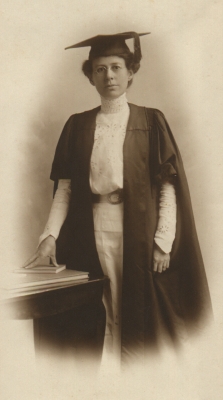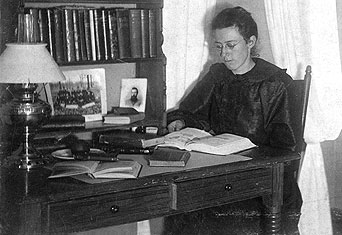 Few people today have ever heard of Rachel Caroline Eaton. Her story has gone uncelebrated for the most part, which is odd considering how many firsts she accomplished. Rachel C. Eaton is believed to be the first Oklahoma Indian woman to receive a Ph.D., and the first woman county superintendent of schools in Oklahoma. Rachel C. Eaton was Cherokee, enrolled on the Dawes Roll. She dedicated her life to history and education. She taught at numerous universities and wrote a book on Cherokee history called John Ross and the Cherokee Indians.
Few people today have ever heard of Rachel Caroline Eaton. Her story has gone uncelebrated for the most part, which is odd considering how many firsts she accomplished. Rachel C. Eaton is believed to be the first Oklahoma Indian woman to receive a Ph.D., and the first woman county superintendent of schools in Oklahoma. Rachel C. Eaton was Cherokee, enrolled on the Dawes Roll. She dedicated her life to history and education. She taught at numerous universities and wrote a book on Cherokee history called John Ross and the Cherokee Indians.
“Callie,” as she is affectionately called, was born July 7, 1869 near Flint Creek, Cherokee Nation. Her father George Washington Eaton was a Civil War veteran who was born in the Republic of Texas. Her mother Nancy Elizabeth Ward Williams was a part Cherokee woman whose mother walked on the Trail of Tears. Callie attended tribal schools and the Cherokee Female Seminary in Tahlequah, Oklahoma. It was during her senior year that the original Female Seminary building burned to the ground. After Seminary she attended Drury College in Springfield, Missouri. From there she went on to the University of Chicago where she received her Ph.D. In 1921, her dissertation John Ross and the Cherokee Indians was published as a Cherokee history book. It is still used today for research by Cherokee historians. In addition to the book’s value as a history book, one chapter of the book “Trail of Tears” was used for many years as a model of excellent English prose at the University of Missouri.
Callie was also an educator who taught in the public schools of the Cherokee Nation, the Cherokee Female Seminary (in the new building which is now part of the Northeastern State University campus) in Tahlequah, Oklahoma, Lake Erie College in Painesville, Ohio, and the Industrial Institute and College of Columbus, Mississippi. She was also Dean of Women at Trinity University in Waxahachie, Texas (now in San Antonio, Texas). She was elected the Superintendent of Public Instruction of Rogers County, Oklahoma in 1920 and served two consecutive terms.
Callie was a member of several organizations including the Tulsa Indian Women’s Club. She was an honorary member in the La-kee-kon Club of Tulsa, The Quest Club of Claremore, and the Pocahontas Club. The Pocahontas Club was a Cherokee ladies club which allowed men to be honorary members. One of these honorary members, while Callie was in the club, was Will Rogers.
 Later in her life Callie wrote a second book, a continuation of her first, called The History of the Cherokee Indians. Unfortunately she died before the book could be published, and the book still remains unpublished. Callie was included in the Oklahoma Hall of Fame in 1936 as one of Oklahoma’s outstanding women. On September 20, 1938 Callie died in Claremore, Oklahoma, after a long battle with breast cancer.
Later in her life Callie wrote a second book, a continuation of her first, called The History of the Cherokee Indians. Unfortunately she died before the book could be published, and the book still remains unpublished. Callie was included in the Oklahoma Hall of Fame in 1936 as one of Oklahoma’s outstanding women. On September 20, 1938 Callie died in Claremore, Oklahoma, after a long battle with breast cancer.
Callie was very proud of her culture and worked her entire life to continue the Cherokee history. The following is a poem written by Callie and used as the club collect by the Tulsa Indian Women’s Club. It clearly illustrates her feelings about Cherokee history and culture.
Let us be wise, in wisdom ever growing,
Steadfast and firm, the needful things to do;
Walk calm, serene whatever winds be blowing;
Attain the heights yet touch the lowly, too.Let us be true; sincere in word, in thought, in action;
Free from all pettiness of soul and mind;
And fair, devoid of prejudice or faction,
Let us be wholly just, supremely kind.We pride of race would cherish veneration
For ancient Knowledge, wisdom, legends, lore;
Would throw the torch each future generation
To grasp and pass, As in the days of yore.We would hold aloft the banners of the Tribesmen,
Lest trailing they be trampled in the mire;
Signal, “Up Ye Peace Chiefs, War Chiefs!” to the Clansmen;
“Sunset! Come Twilight; Renew your Council Fire.”~ Dr. Rachel Caroline Eaton
Published as the club collect in the Tulsa Indian Women’s Club Yearbook 1976-77.
It’s time for a true confession. Rachel Caroline Eaton is known to me as “Aunt Callie.” She was the sister of my great grandmother Martha Pauline “Mattie” Eaton. My grandfather recalls the times when Callie encouraged his own education and development. We are proud to have Aunt Callie as a member of our family history. But I would like for her to someday be recognized for her role in Cherokee history and women’s history. Strides are being made in this direction: the Cherokee Heritage Center included Callie in their “The Printed Word” exhibit several years ago.
Note: The photographs above are from a family collection and cannot be used without express written permission.